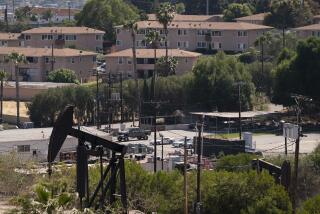We’re Spilling Blood to Support a Profligate Habit; Now, <i> That’s </i> Immoral : Energy: We wouldn’t need oil from Iraq or Kuwait if we didn’t encourage private commuting.
- Share via
Waging war in the deserts of the Middle East is waging war on behalf of the car.
Fact: This country, with less than 5% of the world’s population, consumes 26% of the world’s oil. Two-thirds of that consumption is primarily for private cars.
Fact: Without confiscating private autos, with no real national hardship, no major investment in transit, no economic devastation or budgetary implications, the United States could easily reduce oil imports by the amount that came from Iraq and Kuwait. If the average commuter vehicle occupancy were increased by one person, we could save up to 40 million gallons of gas each day.
The first fact is known to many conservation advocates but was articulated in December by the Bush Administration’s own highway administrator, Thomas D. Larson. The second fact comes from the Automobile Index compiled by the Conservation Law Foundation. This three-page document overflows with facts showing that the costs of our auto and oil dependency are not just stupendously large, but readily remediable through public policy without enormous capital investment for new public transportation. Studies show that tax policy differences have made most Western European countries less than half as auto dependent as the United States.
Grim as it is to realize, we are actually more oil dependent now than we were in the aftermath of the energy crisis of the 1970s. After the 1973 oil crisis, we thought conservation would be traumatic. We found instead that with big changes in attitude and small adjustments in habits, we could make a substantial dent. But in the last decade, we have become lazy and profligate again.
An evolving sensitive and sensible national energy policy fell by the wayside, low-density development policies exacerbated auto dependency, transportation policies remained weighted toward highway building, and tax policies gave employers and employees incentives to continue inefficient commuting practices. Employers, for example, can deduct from taxes the full cost of $15,000 for each parking space they provide--but only $15 a month for a free transit pass.
We’re still encouraging expanded automobile use by planning expressway extensions and widenings from Long Beach, Calif., to Long Island, N.Y., and new ones through some incomparable historical landscapes like Kentucky’s Bluegrass Country, Pennsylvania’s Amish farmland and Atlanta’s historic black neighborhoods, which are in the way of the unnecessary highway to the Carter presidential library.
President Bush speaks of Saddam Hussein’s immorality. Where is the talk about ours? You would think the ramifications of oil profligacy would be thoroughly examined before sending American soldiers to their deaths so more auto users can continue unnecessary and excessive oil consumption. The President could easily fulfill his role as moral leader by defining for each American the act of patriotism that one less auto trip could represent.
We’re learning how to put water-savers on our shower heads in the face of water shortages. We’re learning how to recycle garbage, eliminate excessive packaging, avoid plastic-foam containers and broaden our return policies on bottles and cans in the face of closing landfills. We’re even learning how to clean our commercial smokestacks and develop environmental consciousness for industry in the face of acid rain. But we have not begun to take seriously how central the car is to the full spectrum of environmental issues that concerns the public.
In 1991 we must come to grips with the car in a fundamental way. The national highway program is up for review; the Surface Transportation Act is up for renewal--the legislation that will determine whether we continue four decades of unabated highway expansions, increase the size, weight and density of truck traffic and perpetuate tax policies that favor private-car commuters and oil imports.
A serious reorientation in transportation thinking could drastically reduce our dependence on Middle East oil. Let’s bring the troops home and wage this bloodless battle instead.






